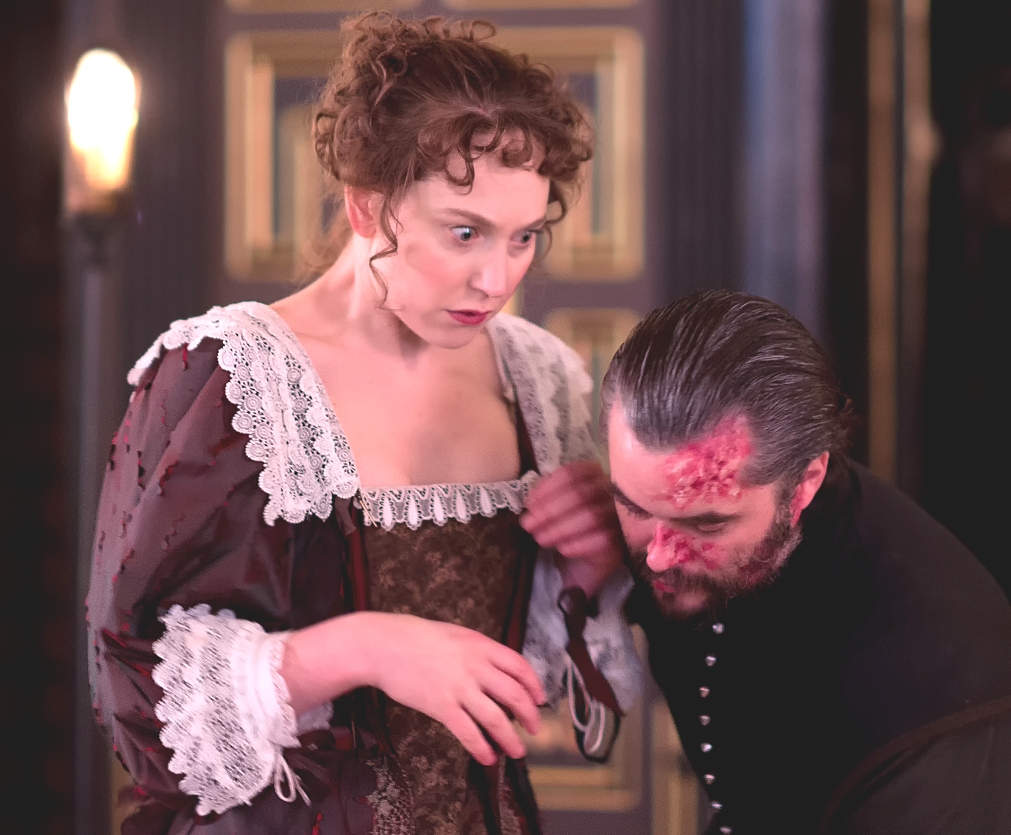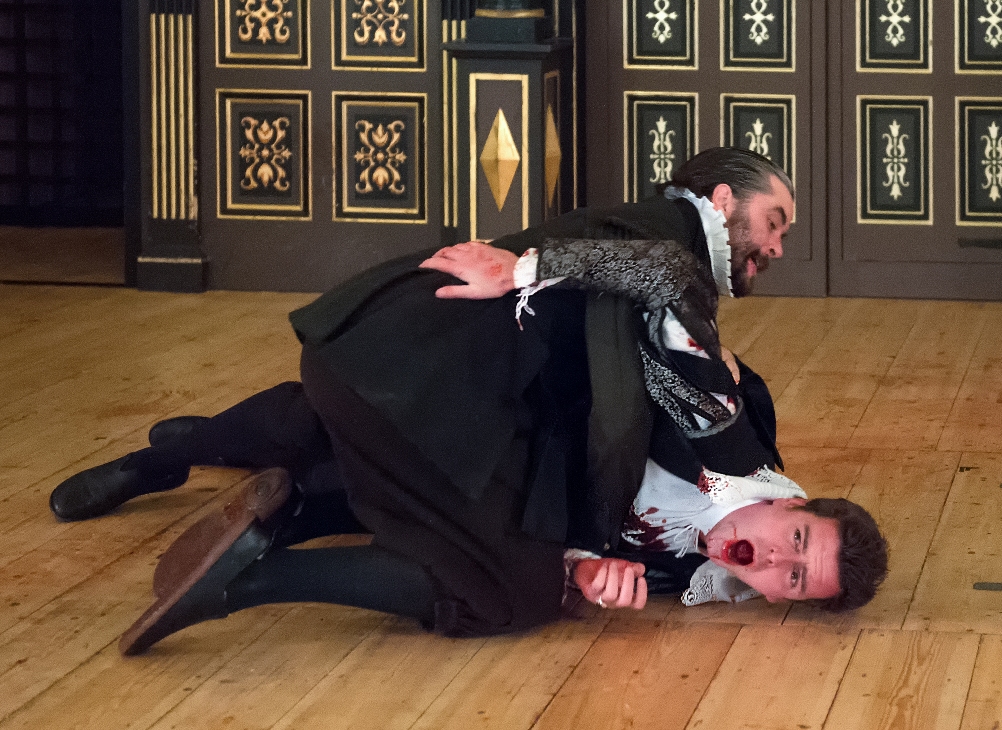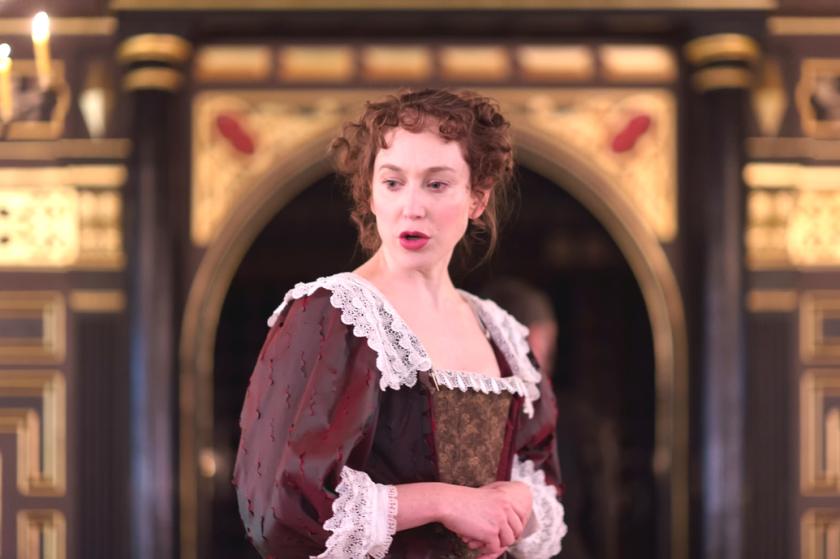Ever been stuck in a claustrophobic space with a group of really unpleasant people? Add mayhem, murder and the kind of razor-sharp wit to be found in only a very few of the nastiest individuals, and you have Dominic Dromgoole’s candlelit production of Middleton and Rowley’s satirical Jacobean nightmare, The Changeling.
That wit is what truly distinguishes this strange experience. The bizarre plot wherein an unwanted suitor and a maidservant are horribly dispatched and lunatics mocked could be more genuinely disturbing in a gritty update, but this fine ensemble of actors in period costume really knows how to twist the humorous knife. Claire van Kampen’s very substantial introduction for string quartet, excellent throughout, successfully pastiches Shostakovich – for entr’actes we get more hint of 17th century manners gone awry – and leads to a plunge into darkness, a lighting of candles: a hint of possible horrors to come. But what do we get? In the first scene, a poetic merchant falling romantically in love with an attractive woman named after Dante’s muse, and even when desires quickly unravel, the intimate space inclines more to laughs from the virtuoso acting than to evocation of the hideous degradation the incidents might suggest.
 Part of this bright confidence stems from Dromgoole’s Globe experience in having the actors make the audience complicit. Middleton and Rowley give us stylized asides in spades, and the queen of manipulation, both in her histrionic range and in her stunning vocal compass from feigned innocence down to contralto depravity, is Hattie Morahan (pictured above with Trystan Gravelle). It’s not long before madness outstrips Beatrice-Joanna’s dubious reasoning. She tries to argue away the murders of her first suitor and the maid who’s supposed to help her fake the virginity she no longer has once villain Deflores (get it?) beds her, but clearly there's mental instability here on the cusp of which Morahan deliciously hovers before it explodes in later scenes.
Part of this bright confidence stems from Dromgoole’s Globe experience in having the actors make the audience complicit. Middleton and Rowley give us stylized asides in spades, and the queen of manipulation, both in her histrionic range and in her stunning vocal compass from feigned innocence down to contralto depravity, is Hattie Morahan (pictured above with Trystan Gravelle). It’s not long before madness outstrips Beatrice-Joanna’s dubious reasoning. She tries to argue away the murders of her first suitor and the maid who’s supposed to help her fake the virginity she no longer has once villain Deflores (get it?) beds her, but clearly there's mental instability here on the cusp of which Morahan deliciously hovers before it explodes in later scenes.
The man she’s supposed to love, Alsemero, succumbs to it, too, in the more successful aspect of Simon Harrison’s otherwise prosaic characterization. Even Trystan Gravelle’s scurvy-faced Welsh knave, so cool and logical at the start, is seized by furies as the ghosts of the murdered return to haunt him (Gravelle, pictured below, as Deflores finishes off Tom Stuart's Alonzo).
 What a weirdly compelling pair of lovers Morahan and Gravelle make, not implausibly half in love with violent death as well as with each other as they head towards disaster, the negative image of Beatrice and Benedict. The tricky counterplot in the asylum of bogus doctor Alibius (Phil Whitchurch) just about works thanks to Pearce Quigley’s genuinely funny/nasty servant Lollio and Brian Ferguson’s skill in feigning the fool as Antonio becomes the changeling to woo Alibius’s young wife; Sarah MacRae has beguiling deportment but fails to make Isabella’s perversity entirely clear. At least we get all of this dodgy scenario, one which as Will Tosh’s programme note points out actually paved the way for voyeurs to go gape at the Bedlamites – come see the lunatics on stage! – instead of being a case of art imitating life.
What a weirdly compelling pair of lovers Morahan and Gravelle make, not implausibly half in love with violent death as well as with each other as they head towards disaster, the negative image of Beatrice and Benedict. The tricky counterplot in the asylum of bogus doctor Alibius (Phil Whitchurch) just about works thanks to Pearce Quigley’s genuinely funny/nasty servant Lollio and Brian Ferguson’s skill in feigning the fool as Antonio becomes the changeling to woo Alibius’s young wife; Sarah MacRae has beguiling deportment but fails to make Isabella’s perversity entirely clear. At least we get all of this dodgy scenario, one which as Will Tosh’s programme note points out actually paved the way for voyeurs to go gape at the Bedlamites – come see the lunatics on stage! – instead of being a case of art imitating life.
What larger faults there are can be laid at the door of Middleton and Rowley: the construction dips in the last two acts with the frankly silly device of the virgin-testing potion and over-extended asylum business, though Dromgoole makes the most of the inmates’ dance rehearsal to initiate another powerful sequence with lighting (or lack of it) and music as the candles are snuffed out to usher in the final chain of events. The cast’s strengths, incidentally, also include the callow father of Liam Brennan and another strong servant from Peter Hamilton Dyer, movers and shakers along with Mark Rylance of the Globe’s most deservedly well-loved and revived production, the all-male Twelfth Night. Their presence reminded me what a long way it is from Shakespeare’s romantic Illyria to Middleton and Rowley’s black-comedy Spain.















Add comment